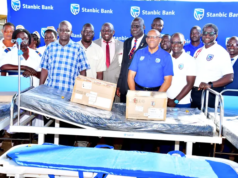
The officials from Arua Hospital have been directed to produce the accountability documents(Photo/Courtesy)
The Public Accounts Committee (Central Government) has tasked Parliament’s Criminal Investigation Department (CID) to retrieve accountability documents related to COVID-19 funding from Arua Hospital.
This is after the Director of Arua Hospital, Filbert Nyeko and the Internal Auditor Eric Olum failed to provide evidence concerning their accountability for Shs270 million Covid-19 funds.
All regional referral hospitals received Shs270 million for the fight on Covid-19.
The team was appearing before committee chaired by Hon. Medard Sseggona which is investigating the unaccounted for funds as revealed by the Auditor Generals’ forensic investigations into the Covid-19 funds.
The committee established that the hospital had spent Shs771 million, which is Shs501 million more than they were given.
While appearing before the committee last week, the Permanent Secretary Ministry of Health, Diana Atwine said that she could not clear the Shs500 million because she did not know about it.
According to Hon. Sseggona, the overly spent amount of Shs501 million is a lot of money, and Ugandans, therefore, deserve knowledge on how this money was used.
When asked where the audit report was by Sseggona, the hospital Internal Auditor, Olum stated that they are at the hospital and this made the chairperson organize transport and security for the officers to travel to Arua and bring the documents.
The documents required include the audit report into the different hotels contracted to accommodate staff and patients during the lockdown, the invoices for the supply and provision of meals and special foods to Covid-19 patients among others.
Some of the service providers mentioned included Alozio general supplies, Hotel Pacific, Heritage courts limited, and Heritage hotels.
Tororo District Woman MP, Hon. Sarah Opendi questioned why the hospital had contracted a supplier of food and also a supplier of utensils.
Dr. Filbert Nyeko said that they used extra money and wrote requests to the ministry but this money was not approved “The number of people sleeping in the hospital was 400 per day. We had a section for health workers to rest and patients to get treatment. We also had three meals in a day which initially before Covid-19 was never provided to patients and workers,” he said.
He emphasized that the funds were used to procure extra materials for the patients which led to extra expenditure.
“At the time, there was stigma around Covid-19 patients. This forced us to purchase disposable materials. We had to add sanitary wear for our female patients too. All these small items as they appear brought a big expenditure,” he said.






